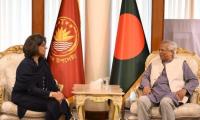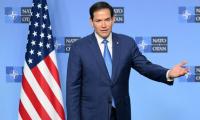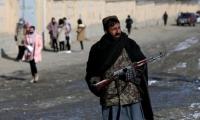ISLAMABAD, LAHORE: Prime Minister Imran Khan Wednesday urged the developed countries to provide debt relief to poorer nations struggling to cope with the coronavirus crisis that had battered their economies.
In an online session of the World Economic Forum (WEF), "The experience of the developed world is completely different to what we are facing in the developing world. Countries like India, Pakistan, and Bangladesh — specifically the Indian subcontinent — our experience is somewhat different.
"The speed at which COVID-19 spread in Europe and the United States; we're not experiencing the same sort of speed. On the other hand, we are still facing the rising number of cases and we still haven't reached our peak here in Pakistan,” he added.
"From day one, the difference between, say, what we've seen in Europe and the United States — and, in fact, even in China — is that we had to face this twin challenge: one was to stop [and] stem the growth of the virus, hence, the lockdown.
"But the bigger challenge in our country is how to mitigate the effects of lockdown on our population with the rising poverty. We, in Pakistan, have 25 million workers, who either are daily wagers or get paid weekly or are self-employed. When we [impose a] lockdown like the whole of the world to stop the spread of the virus, all these people became unemployed.
"When we are talking about 25 million workers, we are talking about 25 million families. And, actually, it has affected around almost 120-150 million people [who] face stark poverty.
"Unless the men and the women work, they cannot feed their families. What my government did was we launched a cash programme and reached nearly 15 million families with cash transfers but this is only a short-term solution." "Therefore, despite the raising cases in our country, we have decided to ease our lockdown and reopen our construction industry so that people can find employment because there is no way that the government can provide for all. The only way we can do that is by providing employment.
"The way forward that we have this year as a nation is that we realise that we have to live with this virus at least until a vaccine comes out and balances it. We have raised a volunteer force in this regard — of one million volunteers — who will help the administration as it is already overburdened and so are the law enforcement agencies.
"This volunteer force will encourage people not to have large gatherings and spread awareness among masses to follow the SOPs [standard operating procedures] necessary to stem the virus.
"Just before this pandemic hit us, we had managed to balance our twin budgets — the current account and fiscal deficit. After very tough reforms, we had thought of the growth of the economy.
"The coming year is not just a challenge for Pakistan but for the world. There has to be more interaction between the countries in dealing with this challenge so far. "When it hit the countries, they took unprecedented measures so every country looked inside and became insular. I feel that we are connected and the response has to be global.
"There has to be a way of picking up countries, especially in the developing world. I have spoken to the Ethiopian prime minister, the Egyptian president, [and] the Nigerian prime minister [and] all of them are facing similar problems as us.
"Their exports are falling but also, additionally, we face the problem of falling remittances. Our country depends a lot on the remittance from the Gulf countries and due to the fall in oil prices that has had an effect on it.
"We have geared up and our economic think-tanks are mulling over how we are going to deal with the coming year.
"At the same time, we have developed a very good National Command and Control Centre [NCOC] and the whole idea is that we aim to balance the whole thing. They monitor where the cases are growing, how we are going to deal with them, isolate individual areas where there is fear of spreading, and, at the same time, how we can keep our economy going."
Speaking of a global debt programme, PM Imran said: "The G20 has come up with a debt relief plan but it needs more details and work. Let me just put it this way: many of the developing countries face this situation where, because of their debt servicing, their fiscal space has contracted and they are unable to cope with this challenge of health facilities.
"The reason why there should be a debt relief and the G20 is looking into it is because we need to divert those resources to health and also to environment and, unfortunately, that space is not there," he added.
Meanwhile, inaugurating the telehealth portal here, Prime Minister Imran Khan said the country will need more doctors in case of increase in the corona cases and lamented that the doctor-to-patient ratio in Pakistan was quite low as compared to other countries.
The portal will help people with medical emergencies. Imran said the nation would have to live with the coronavirus for some time until a vaccine was developed. The premier was confident that the whole nation would work together to confront the corona threat.
“We have to live with this virus for some time until a vaccine is developed, as even the advanced countries having abundant resources are unable to cope with the situation,” he said. However, he was of view that the Covid-19 situation was not as bad in Pakistan as in other countries, and even the most advanced nations.
He said, “In this context, we are facing a bigger challenge, as in past adequate investments were not made in Pakistan in the health sector.” On this occasion, he congratulated the team of Digital Pakistan for realisation of the project at a very critical time.
Earlier, Special Assistant to Prime Minister on Digital Pakistan Tania Adrus gave a detailed briefing to the prime minister on the Telehealth Portal. She said citizens could contact any doctor through this free service.
Special Assistant to the PM on Health Dr. Zafar Mirza said a safe environment would be provided to doctors and patients through this gateway. He said citizens could also ask questions and seek guidance from medical experts through this portal.
The countrywide coronavirus death toll crossed the 1,000 mark on Wednesday while the number of infections increased to 47,282. So far 1,009 deaths have been reported with 23 deaths on Wednesday
Of the total 47,282 confirmed cases, Sindh reported 18,964 cases, Punjab 16,685, Khyber Pakhtunkhwa 6,815, Balochistan 2,968, Islamabad Capital Territory (ICT) 1,138, Gilgit-Baltistan 579, and Azad Jammu and Kashmir (AJK) 133 as of 10:40pm.
The number of casualties rose to 1,009 with Khyber Pakhtunkhwa reporting 351 deaths, Sindh 316, Punjab 290, Balochistan 38, Gilgit-Baltistan 4, Islamabad Capital Territory 9, and AJK 1.
According to the data from the US-based Johns Hopkins University, which maintains a dashboard of COVID-19 cases worldwide, Pakistan is listed at 19 in terms of the number of people infected, out of a total of 188 countries and regions.
In terms of fatality, Pakistan has the 25th most number of deaths related to coronavirus in the world. In a related development, the All Pakistan Transports Federation Wednesday announced the resumption of public transport operations.
With 20 per cent reduction in fares of buses, passengers will sit seat by seat. The transporters said in a press conference that one passenger will sit on two seats if the bus ran on motorway. It is pertinent to mention here that on the direction of the CM Punjab, a committee headed by Provincial Industries and Trade Minister Aslam Iqbal held discussions with transporters at the Transport House in which matters pertaining to implementation of SOPs to run public transport and demands of transporters came under review.
Provincial Transport Minister Jehanzeb Khan Khitchi, Secretary Transport Asadur Rehman Gillani, President of Transport Alliance Action Committee Asmatullah Niazi and others attended the meeting. Iqbal reiterated that the government wanted to run transport so that common man should not face difficulties. \He assured that the due demands of transporters would be fulfilled so that the vehicle of common man should run smoothly on the road.
Khitchi said, “It is our mission to save the masses from trouble and provide best travelling facilities to them.” He stressed that no stone will be left unturned to attain this noble mission.
Talking with media representatives, Iqbal apprised that 20 per cent decrease in transport fares of vehicles plying on motorway will not be made and social distancing measures should also be adopted while traveling. All passengers will wear masks and use of hand sanitizers will have to be ensured, he added.
He said 20 per cent decrease will be made in transport fares of vehicles running on GT road and implementation of SOPs will also be ensured. He said if one family is travelling from one city to another, they could sit together. He underscored that precautionary measures will have to be adopted while traveling and disinfection of buses is also mandatory.
Meantime, the Pakistan Railways started a limited operation from Wednesday morning by running 30 trains after getting approval from Prime Minister Imran Khan to facilitate citizens ahead of the upcoming Eidul Fitr.
The first train 101-Up Subak Raftar left Lahore with 105 passengers for Rawalpindi under strict standard operating procedures (SOPs).
The Railways management has appealed to passengers to follow SOPs and maintain distance with others and travel only when needed with limited number of passengers. Booking for trains would be done only through online ticketing service while booking offices would remain closed. The booking would be closed after 60 per cent of occupancy in trains.
Meanwhile, Sindh information minister Nasir Hussain Shah Wednesday said congregational prayers for Shab-e-Qadar, as well as Eid morning prayers will be observed across Sindh with all necessary safety precautions enforced.
Shah said Ulema of various schools of thought would be consulted for the successful implementation of the decision, as he addressed a press conference in Karachi alongside law adviser Murtaza Wahab and education minister Saeed Ghani.
Saeed Ghani, taking over the briefing, said that processions for Ramadan 21 had not been permitted after experts recommended against it and recognised that the Ulema had followed the decision.
The education minister expressed concern that rules were being flouted in marketplaces. "Now that the restrictions against large gatherings have been lifted, it will not be fair to disallow congregational prayers for Eid," Wahab, however, said.
In a related development, the Punjab Cabinet Committee on Law and Order has agreed to a proposal for opening 544 shrines managed by the Auqaf Department across the province with strict implementation of the standard operating procedures (SOPs) decided by the Health Department. The decision was taken at a meeting of the Cabinet Committee at the Civil Secretariat, with Provincial Minister for Law and Social Welfare Raja Basharat in the chair on Wednesday.
Teams have already started landing in Karachi for mega event planned and finalised following series of recent meetings
PTI’s MPA Ahmer Rasheed Bhatti and PPP’s MPA Syed Ali Haider Gilani have officially joined committee
This will be Aurangzeb's second budget speech after assuming office
“Is this a joke? Why is the case being unnecessarily delayed?” Justice Mandokhail asked the AAG
Trump sent letter to Iran’s supreme leader urging talks and warning of possible military action if Iran refused
Sources say government believes he did not safeguard province’s interests in authority







